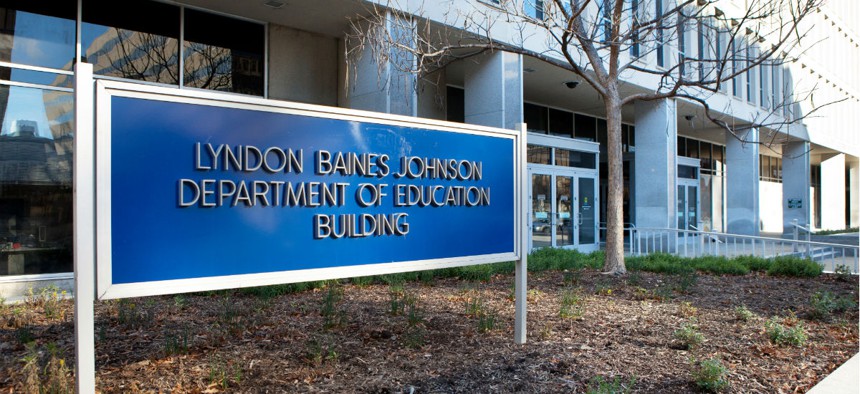
By Mark Van Scyoc / Shutterstock.com
Labor Agreement Forced on Education Dept. Employees Curtails Official Time, Cuts Employee Protections
AFGE has filed an unfair labor practices charge against the agency over a collective bargaining agreement that the union never approved.
Officials with the largest union representing federal employees have filed an unfair labor practices charge against the Education Department, after the agency unilaterally implemented a new collective bargaining agreement without approval from the labor group.
According to a charge filed with the Federal Labor Relations Authority by the American Federation of Government Employees, agency and union leaders were in the midst of ground rules negotiations on a new labor-management agreement, only to be informed that the agency would draft a collective bargaining agreement on its own. That document was released last week and took effect Monday without approval from union members.
“From the council’s perspective, they felt everything had been going fine at the negotiating table,” said AFGE spokeswoman Ashley De Smeth. “They felt blindsided, definitely.”
In a statement, Education Department spokeswoman Liz Hill blamed the situation on labor representatives.
“The union spent more than a year dragging its feet on ground rules negotiations without reaching any agreement, and then failed to respond in a timely manner to negotiate over the contract proposed by the department,” she wrote. “This contract complies with all statutory requirements and maintains union members’ rights under the Civil Service Protections Act and the Federal Labor Relations Act.”
AFGE assistant general counsel Ward Morrow said the labeling of the new labor roadmap as a "collective bargaining agreement" is farcical.
“The agency is claiming now that this is the CBA, but there’s nothing collective about it, it wasn’t bargained, and there hasn’t been an agreement,” he said. “This is the agency’s edict on how they’re going to treat labor relations.”
The new document removes dozens of provisions that existed in the agency’s 2013 agreement, including telework; child and elder care; guidelines for promotions, step increases and bonuses; and protections for employees with disabilities. The results have been “chaos,” AFGE representatives said.
“As far as we’ve been notified, there are only eight pillars remaining of what used to be a 44-pillar CBA, and those eight things are the only things that exist now,” De Smeth said. “We had several employees who were on 100 percent telework agreements. Now that there’s no telework provision [in the contract], they’ve had to scramble to get to the facility they report to, and they don’t even live in the same town.”
The new bargaining agreement also significantly curtails the ability of union representatives to use official time, a practice where unions are paid to address workplace issues. The document forces them to use unpaid leave for such duties. It reduces the number of stewards authorized to use official or representational time from 75 under the previous agreement to 10, and it requires employees to request permission from their supervisor before using unpaid leave for union representational work.
“Official time is something that’s been designated [throughout government],” Morrow said. “If you make it leave without pay, you’re requiring people by law to represent people whether or not they pay dues, and now you’re making them do it for free. We don’t—in the federal sector, the public sector or the private sector—no entity requires people by federal law to represent people [on labor issues] and to do it for free. They’re trying to create something here that doesn’t exist.”
The document also ends the practice of the department providing office space to the union at both headquarters and 10 regional units.
“The council and the locals have a few federal retirees, people who were 20-plus year workers at the department, but because the contract takes away union office space and all union equipment, the agency will be cutting them off from coming into the building,” Morrow said. “They’re volunteers, but they’ll get locked out of the building starting after tomorrow.”
Morrow said the union is seeking a so-called “status quo” remedy, which would force the Education Department to abide by the 2013 CBA until good-faith negotiations with the union are completed to iron out a new agreement.







